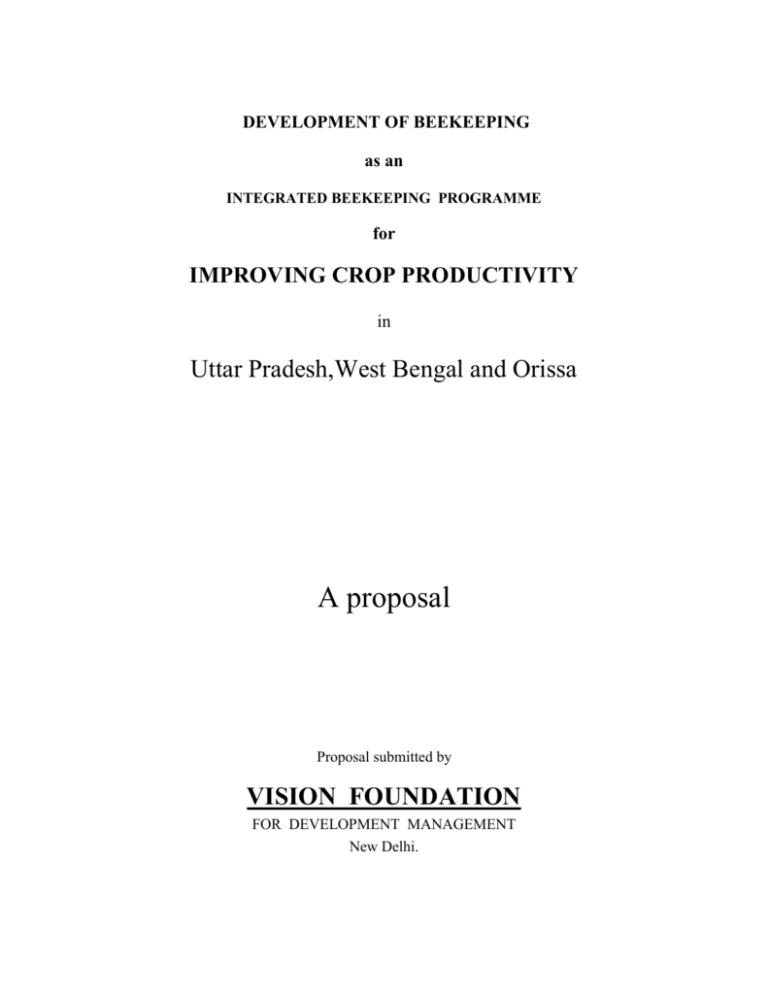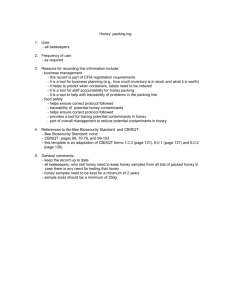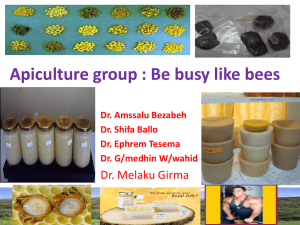for development management
advertisement

DEVELOPMENT OF BEEKEEPING
as an
INTEGRATED BEEKEEPING PROGRAMME
for
IMPROVING CROP PRODUCTIVITY
in
Uttar Pradesh,West Bengal and Orissa
A proposal
Proposal submitted by
VISION FOUNDATION
FOR DEVELOPMENT MANAGEMENT
New Delhi.
1.0 NAME OF THE PROJECT:
DEVELOPMENT OF BEEKEEPING as an INTEGRATED BEEKEEPING PROGRAMME for IMPROVING
CROP PRODUCTIVITY in Uttar Pradesh,West Bengal and Orissa
2.0 NAME OF THE PROJECT HOLDER:
VISION FOUNDATION for Development Management, New Delhi. ( In Short, VISION
FOUNDATION)
2.1 Address & Contact Details :
B-51, Amar Colony, Lajpat Nagar-IV, New Delhi-110024.
Phones: 26213930, Fax: 26239898, Email: foundation.vision@gmail.com.
Web: vfdm.org
2.2
Legal Status:
VISION FOUNDATION is a registered Society under,
1.
Society Registration under Society Registration Act, 1860, No- S-26535.
2.
Foreign Contribution (Regulation )Act(FCRA) Regn No- 231650950.
3.
Income Tax Exemption order number under 80 (G) of Income Tax Act,
1961
2.3 BRIEF TRACK RECORD
2.3.1 WHY VISION FOUNDATION?
By now, it is a global realisation that, Management of the HUMAN
DEVELOPMENT SYSTEM with it’s numerous sub-systems, where each one is a
developed body of knowledge and activity, needs highest possible degree of
expertise.
Against this realization, the reality is, Human Development is managed by people
with expertise in one or few areas of activity , who find it difficult to comprehend
the TOTAL HUMAN DEVELOPMENT SYSTEM. This results in limited productivity
of the investments in Human Development.
From here emerges the NEED for developing a NEW BODY of KNOWLEDGE /
DISCIPLINE and ACTIVITY called DEVELOPMENT MANAGEMENT, integrating all
the relevant sub-systems of HUMAN DEVELOPMENT.
VISION FOUNDATION for DEVELOPMENT MANAGEMENT is established based on
this background.
2.3.2 OBJECTIVE :
2
2
To promote DEVELOPMENT MANAGEMENT as a new discipline of
Management parallel to Business Management with a focus on PRODUCTIVITY &
RESULT and
To provide professional Management support to the Development Sector.
2.3.3 MANAGEMENT :
Developed and managed by Senior Management Professionals, specifically alumni
of IRMA (Institute of Rural Management, Anand) and other reputed Management
Institutes/Universities in India and abroad.
It is headed by Prof. Ranjan Mohapatra, an MBA from IRMA (Institute of Rural
Management, Anand) with integrated exposure to,
Development Sector
Corporate Sector
Management Academics and
An able team of Consultants with brilliant track record in various disciplines like
Economics, Sociology, Psychology, Management, Anthropology, Environment
Organisation Behaviour from Institutions in India and abroad, support the
Chairman and the Governing Body.
2.3.4 MAJOR AREAS OF EXPERTISE
Almost all segments of Human Development Process including,
Agri-Business :
(All Sectors including Edible Oil, Dairy, Fruit-Processing , Forestry & Fishery etc.)
Technology Management
Project Feasibility Analysis
Marketing of Rural Products
Bio-Gas & Manure
Income Generating Programmes
Health & Sanitation
Education
Corporate Collaboration
Environment
Rural Employment
Urban Slum Management and Development
Health etc
3
3
2.3.5 LIST OF SELECTED PARTNERS :
The World Bank, UN-APCTT, World Food Programme (WFP) , CCA/ SIDA ,UNICEF
,UNDP ,NABARD ,Min. of Rural Dev ,SIDBI ,TIFAC ( Dept. of Sci & Tech, GOI) ,Ministry
of HRD, Tribal Welfare, ,Social Justice etc, CARE( India),Eicher Tractors , Rajsthan
Agriculture University, Bikaner , OXFAM, SOS etc.
2.3.6 MAJOR ACHIEVEMENTS:
Selected under the LIVELIHOOD category, the most difficult and globally hot
segment, VISION FOUNDATION has won global recognition for its work in
Income Generation/ Livelihood Support, through its ‘Income for Food’
programme for Women living below poverty line in Urban Slums, Rural and
Tribal areas of India
This Programme received the EXPO-2000 Certification (Hanover,
Germany), and is rated as a Global Standard Project, one among only 487
other such projects worldwide to receive this recognition
Development and Registration of India’s first Cooperative Bye-Laws for BioManure Producers’ Cooperatives
Set up the first All Women’s Bio-Manure Cooperative in India in Ambala
Cantonment, Haryana
Established a Market Brand for products developed by Women Self Help
Groups
VISION was selected as one of seven NGOs in Delhi, for the execution of a
Model Garbage Collection System by the Delhi Government
4
4
3.0 PROJECT DETAILS:
3.1
BACKGROUND & NEED of the Project :
It is a fact that the potentials of Bee-Keeping as an industry has not been exploited in
India, though the potentials are in,
a)
b)
c)
Income and employment generation through production, processing and marketing
of Honey for medicinal purpose and for direct consumption.
Increase in agricultural yield through pollination.
Foreign Exchange Earning from International Markets.
The potentials have not been exploited primarily due to,
1.
lack of marketing outlets for Honey to ensure remunerative prices and
2. lack of integrated approach to beekeeping as an industry to reduce operating
costs and increase sales realisation.
Market Study Findings :
Our consultants along with Apiculture Experts visited the potential areas in UP,West Bengal
and Orissa and met the officials of the Govt. dealing in Beekeeping Programme in
December' 2007. The information collected during the field visits, has been used in
designing the following Project.
Major Findings of the field study :
1.
There is enough potential for producing Honey on a regular basis, from the
Crops available in these states through a proper systems and employment can
be generated for large number of people.
2.
The Beekeepers already engaged in the activity are selling to the private
traders / companies at low rates like Rs 50/- per kg, due to absence of their
own Marketing Network.
Market Study:
We have conducted a dipstick study of the retail and wholesale Honey Market of Delhi
Metro in Oct.-Dec.'2007.
Major findings of the study:
1.
Market Size-All India (both retail plus whole sale) is estimated to be
10,000 MT per Year.
2.
Potential for growth is high both in domestic and export market and
the growth rate depends upon the promotional inputs used for
promoting the consumption of Honey in domestic market, which is
limited to upper-income house holds only and increasing production of
good quality honey for international market.
5
5
3.
Prices of Honey Sold in Packs ranges from Rs 100 to Rs 180 per Kg
and in Whole Sale market it is sold at Rs 60-70 per kg.
Price of the leading brand in Delhi Market is as under.
Pack size
Dabur
1 Kg
Rs 170
.5 Kg
Rs 85
100 Gm
Rs 21
4.
Honey is being purchased by established companies from these points
of production at abnormally low prices like Rs 50-60 and being
marketed at the above high prices, making all the profits.
5.
There is shortage of Pure Honey and the market is flooded with
artificial honey. Therefore the consumer is skeptical about buying
honey from the open market, which affects the volume of consumption.
Thus, there is a NEED set up an Bee-Keeping Project , integrating Production,
Processing And Marketing and promote a brand of PURE HONEY to pass on the
profits to the Bee-Keepers directly through a Co-operative Mechanism or through a
Self Help Group, creating employment for lakhs of people in the process,
increasing yield of crops and improving health of consumers by selling pure honey.
.
6
6
3.2 PROJECT OBJECTIVE:
To develop Producer owned SHG GROUP, integrated (producer & consumer),
professionally managed, market linked Beekeeping Project as a model for
replication in the different parts of the country to exploit the full potentials of the
industry and contribute to,
i.
Employment generation.
ii.
Production of honey as a nutritious diet.
iii. Opportunity to increase export and generate foreign exchange.
iv. Medicinal use.
v.
Increase in agricultural productivity through pollination.
vi. Improving public health
3.3 METHODOLOGY / FEATURES OF THE PROJECT :
3.3.1 Project Area :
The project is planned to cover the belt of UP , covering Kanpur, Dehradun,
Haridwar, Shimla, and Chandigarh with it's headquarter at Dehradun and the belt
of West Bengal, covering, Asansol, 24 Pragana, Burdwan, with head quarter in 24
Pragana, the bet of Orissa, coveing, Koraput, Kalahandi and Nua Para, with Head
Quarter in Koraput.
These belts are selected due to technical considerations in terms of crop
availability for Bee-Keeping.
As per the Field Study and Research, the area is expected to provide year round
Beekeeping activity and provide best possible returns to the Beekeepers.
3.3.2 Activities of the Integrated Project :
S.No.
Activity
Nature of Activity
i.
Cooperative Education, Extention
(ProducerOrganisation Development
and SHG formation organising the
producers)
( Input/ Seed Development )
( Production )
( Processing )
ii.
iii.
iv.
Bee-breeding
Beekeeping
Honey collection & Processing
v.
Packaging & Marketing
( Marketing )
vi.
Training & Supervision
( Production Support )
7
7
3.2.3 Extension & Coop Formation :
Project personnel will educate and organise the rural women & men interested in BeeKeeping as an income generating activity to form coops of their own, to act as production
units and receive supports like inputs, training, marketing from the Project.
In case felt appropriate, in the first phase, Self Help Groups (SHG) will be formed, which
will be registered as Coop. Societies in due course.
3.2.4 Bee-Breeding:
Under this activity different varieties of bees will be developed and sold to the individual
beekeepers. This bee-breeding will be an independent activity under the project to be
treated as a profit centre.
3.2.5 Bee-keeping
The beekeeping will be done by a team of trained beekeepers, who will be working in
this belt through out the year. They will be moving from place to place depending upon the
crop available for beekeeping.
Their movement in the field will be coordinated through a Route Chart and regular
communications between the Beekeepers with the Regional Centres to be setup at Kanpur,
Haridwar, Dehra Dun, Shimla and Chandigarh., , Asansol, Burdwan , 24 Pragana , Koraput,
Kalahandi, Nua Pada.
The Headquarter will be in a position to know the progress of the Beekeepers in different
field locations through a MIS system and will coordinate Honey Collection, Processing,
Packaging & Marketing in addition to supervision & control.
8
8
3.2.6 Honey Collection & Processing
Honey collection will be organized by modern equipment and trained staff at all the
Regional Centers as mentioned above.
3.2.7 Marketing
We have conducted a dip-stick study of the retail and wholesale Honey Market of Delhi
Metro and the market Size is estimated to be 500 MT per Month ie 6000 MT per Year. The
potiential for growth is high both in Indian Market and in Export Market.
In the first phase the Honey will be marketed in Delhi metro market and then in other parts
of the country. Arrangements have been made for marketing the Honey produced by the
Project.
The strategy proposed promoting the programme / project is given below.
1.
2.
Promote the practice of using bee keeping as a means of increasing yield, which will
lead to the project revenue received from the farmers.
Promote the concept of pure honey.
3.2.8 Training on Beekeeping & Supervision
Training is a critical input for the project as the technology of beekeeping is not a common
knowledge, and the training has to be an ongoing process through class room coaching
supplemented by on-the-job training.
Supervision has to be a professional job done with the help of professional managers &
trained to supervise this type of activity to achieve the full potential.
3.2.9 Beneficiaries / Beekeepers Selection and Organisation :
Beekeepers will be selected from these five regional centers on the basis of a strict
selection procedure designed to select the genuine, committed people, with or without
Beekeeping experience.
The selected people / beneficiaries will be organised in Self Help Groups (SHGs) to start
with and these SHGs will be registered as "Honey Producers SHG GROUPP " in due course
as the activities grow.
3.2.10
Operation of the Project:
Selected members in groups will be given,
1.
A Box for Beekeeping,
2.
Bees
3.
Training for beekeeping
4.
A Route Chart to follow.
The members will have to pay for the Box and the Bees, but the Training will be free of
cost. Members will use the Box and Bees to produce Honey and submit at the Regional
9
9
Centers, the Center I/C will keep record of the honey collected and make necessary entries
in the Pass Books of the Members, on the basis of which they will be paid.
Payments to the Members / Beneficiaries :
The members of the project / beneficiaries will be paid the price of the Honey supplied at
the market rate prevailing and decided by the Management Committe consisting of the
Director, and all the officers. The profits generated at the end of the year after marketing
the Honey after processing and packing, will be again distributed among the members in
the ratio of their contribution of honey, after retaining a percentage of profit for
organisational development etc.
3.2.11
Activity / Output Projection : Honey (in MT)
UP
WB
Orissa
1st year
1600
1100
1000
=3700
2nd year
6000
5000
5000
=16000
3rd year
12000
10000
10000 =32000
Total :
19600
16100
16000 =51700
10
10
*
Each Bee-keeper will have 20 Boxes. The boxes will be moved from center to center
as per the availability of crops after collecting the honey, which will be sent to Head
Quarter for processing.
*
Rate of Production / Collection of Honey : Average honey collection per box is
expected to be 60 Kg per year.
4.0
PROJECT MANAGEMENT & SUSTAINABILITY :
4.1
Management & Organization Structure.
The project will be managed by a core team of professionals specializing in these respective
fields to head each activity as per the organization structure given below.
Project Director
|
__________________________________________________________
|
|
|
Inputs & Training
|
Beekeeping, Processing,
Bee breeding
Finance & Administration
Packaging
&
Marketing
|
Regional Centers
_______________________|_____________
|
|
|
|
|
Field Centers like Haridwar Dehradun Shimla
Chandigarh, Burdwan, Asansol, 24 Pragana, Koraput etc.
|
______________________________________________
(Bee-Keepeing Self Help Groups / Cooperative Societies)
11
11
4.2
Manpower:
The project team will involve following positions.
Project Director, Officer In-Charge of Input, Training, Bee-Breeding, Assistants,
Officer In-Charge of Beekeeping, Processing, Packaging, Marketing, Assistants,
Officer In-Charge of Finance & Administration, Assistants Regional Center I/C,
Attendants
4.3
S.No
Projected Sales Realizations :
Item
1.
Sale of Honey Qty.(MT)
2.
Value of Sale (Rs in crores)
Amount (Rs.in crores)
@ Rs 100 per kg-
Yr-1
Yr-2
Yr-3
3700
16000 32000
37
160
320
__________________________________________________________________
12
12
NOTE :
{Following incomes are not budgeted even if they will contribute to the profits of the
project as the sales realisation from Honey is sufficient to make the project successful.
-
Sale of Bees-@ Rs 1400 per Box.
(250 (Ist Year) members x 20 boxes
per member x 1400)
Rs 70,00,000
-
Fees from farmers,
Rs 1,00,000
-
Boxes will be sold on cost price. }
__________________________________________________________________
4.4
TOTAL COST OF OPERATION:
4.4.1 Direct Operating Cost :
S.No
Item
Amount (Rs in crores.)
Yr-1
Yr-2
Yr-3
3700
16000
32000
15
64
128
1.9
8
16
Overheads:
1.5
2
3
Total:
18.4
74
147
2
3
(Honey Prod-MT)
1.
Payments for raw honey
@ Rs 40 per Kg
2.
Processing Fees:
@ Rs 5 per Kg.
3.
6.2 Indirect (annual) Overheads:
(Salary of the Staffs, Transportation,
Electric, Stationery & Printing, Miscellaneous) :1
13
13
6.3
Working Capital Requirement:
9
7.0
INVESTMENT NEEDED:
7.1
Total Fixed Cost :
36
73
7.1.1Building & Furniture & Equipments:
1.
58 Crores
Land & Building at 12 locations to house Bee-breeding center,
Training Center, Administrative Depts.:
50 crores
2.
Furniture & Fixtures at 12 locations
6 Crores
3.
Equipments (Boxes) at 12 locations
2 Crores
14
14
7.1.2 Processing, Packaging & Quality Control Lab:
6 Crores
7.1.3 Marketing Infrastructure Development:
16 Crores
7.1.3 Working Capital Cost:
100 Crores
______________________________________________________________
Grand Total Investment:
8.0
Rs. 180 Crores
PROFITABILITY :
Amount (Rs.in crores)
Sales Realisation :
Less Cost of operation :
Yr-1
Yr-2
Yr-3
37
160
320
18.4
74
147
____________________________
Gross Profits :
Total Gross Profit in 3 yrs:
18.6
86
177
281.6=182
Less Fixed Cost: ( Interest on Capital and Depreciation , if not considered for first three
9.0
years )
0
0
0
Net Profit :
18.6
86
177
CAPITAL RECOVERY and SUSTAINABILITY:
As per the above, the Total Investment will be realized before third year, if market conditions remain
favorable, making the project sustainable.
Here the Marketing Expertise of VISION FOUNDATION team, who have already developed a
brand of HONEY and marketed under VISION Brand in KVIC outlets will be highly useful.
PILOT PROJECT :
The Bee Keeping Women SHGs of VISION FOUNDATION’s pilot project are based in Saharanpur
, Uttar Pradesh, who are engaged in Bee Keeping , the raw honey is procured from Saharanpur and
processed in KVIC , Delhi and marketed in Delhi under VISION brand. The profits are shared
among the SHG members.
The photographs of VISION Honey is attached herewith.
15
15
10.0 CONCLUSION:
1.
Income for about 60000 Bee-Keeping Families in three states and paying Rs 48,000 per year
plus the part of a huge profit in crores as dividend as mentioned above.
2.
Marketing Network developed for long-term benefit.
3.
Developing a model for integrated development of the Beekeeping / Apiculture Sector.
-0-
16
16




